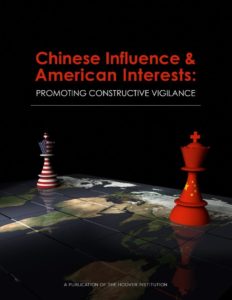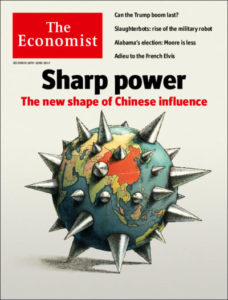 Discussions of what China’s rise will mean for the world often take on an abstract, impersonal quality, notes Hal Brands, the Henry Kissinger Distinguished Professor at Johns Hopkins University’s School of Advanced International Studies.
Discussions of what China’s rise will mean for the world often take on an abstract, impersonal quality, notes Hal Brands, the Henry Kissinger Distinguished Professor at Johns Hopkins University’s School of Advanced International Studies.
We use terms like “international order,” “geopolitical competition” and “balance of power.” Yet the case of Michael Kovrig, the Canadian ex-diplomat unjustly detained in China for nearly two months, reminds us that the rise of a brash authoritarian power comes with profoundly human consequences, he writes for Bloomberg Opinion.
China has certainly benefited from an international order that has allowed it to prosper from relatively open trade with other countries, notes Georgetown University’s David M. Edelstein. At the same time, China is less enamored of other aspects of the so-called “liberal international order,” including the promotion of democracy, he writes for War On The Rocks:
While China may desire a dominant position in East Asia, it is unclear how concerned Beijing might be about the prospects of South Korea or Japan were they unconstrained by their American ally. In short, reaction to Chinese revision of the international order may be enthusiastic in some areas, but it may be more reluctant in others.
 Beijing’s ability to carry through on such revisions to the order will depend on its ability to combine coercion and persuasion in its relations with other countries in Asia and beyond, adds Edelstein, the author of Over the Horizon: Time, Uncertainty, and the Rise of Great Powers (Cornell University Press, 2017).
Beijing’s ability to carry through on such revisions to the order will depend on its ability to combine coercion and persuasion in its relations with other countries in Asia and beyond, adds Edelstein, the author of Over the Horizon: Time, Uncertainty, and the Rise of Great Powers (Cornell University Press, 2017).
A leading Chinese state-run media organization has registered as a foreign agent under orders from the Justice Department, a public filing shows, as the administration takes a harder line on Chinese government-led activities in the U.S., the Wall Street Journal reports:
In a January 2018 letter, Sens. Marco Rubio (R., Fla.), Patrick Leahy (D., Vt.) and others asked the Justice Department to examine registration requirements for Xinhua and CGTN. The senators cited a National Endowment for Democracy report that said China and Russia had been exploiting a “glaring asymmetry” by raising “barriers to external political and cultural influence at home while simultaneously taking advantage of the openness of democratic systems abroad.”
 Democracies need to develop “new capabilities” counter authoritarians’ information warfare, says a senior U.S. official.
Democracies need to develop “new capabilities” counter authoritarians’ information warfare, says a senior U.S. official.
“We need to give renewed emphasis to the information environment,” said Andrew Knaggs, deputy assistant secretary of defense for Special Operations and Combating Terrorism. “Our competitors have proven how irregular approaches can effectively shape an environment to their advantage in the pursuit of their national interests.”
“Our adversaries have weaponized disinformation and propaganda to their advantage….Rather than hiding from the transparency afforded by the 24-hour news cycle and pervasive social media, our adversaries embrace that cycle and they use it to their advantage,” he added.
“It will also require new partnerships beyond traditional actors, throughout the world, through efforts to amplify voices of [non-governmental organizations] and individual citizens who bring transparency to malign activities of our competitors,” he said.
 The Chinese Year of the Swine, 2019 marks the 100th anniversary of the nationalist May 4 movement, 70 years of Communist party rule, 60 years since a failed Tibetan uprising forced the Dalai Lama to flee, 20 years since the Falun Gong crackdown and 10 years since riots killed hundreds in Xinjiang, notes FT analyst Jamil Anderlini:
The Chinese Year of the Swine, 2019 marks the 100th anniversary of the nationalist May 4 movement, 70 years of Communist party rule, 60 years since a failed Tibetan uprising forced the Dalai Lama to flee, 20 years since the Falun Gong crackdown and 10 years since riots killed hundreds in Xinjiang, notes FT analyst Jamil Anderlini:
The 1989 Tiananmen protests attracted so much popular support in part because their student leaders explicitly drew parallels between their demonstrations and those of their patriotic predecessors in 1919. The significance of these dates is heightened by the Communist party’s fixation on anniversaries. Mr Xi himself has made celebrating the “two centenaries” — the 100th anniversary of the founding of the Communist party in 1921 and the 100th anniversary of the People’s Republic in 1949 — central to his ideology of “rejuvenating” the Chinese nation.







